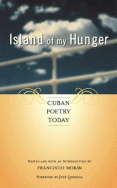Haines Eason

by Francisco Morán, ed.
City Lights Books
2007
16.95
We just may witness open dialogue between our nation and Cuba in the foreseeable future. And since the silence between our countries was part of a border of non-communication spanning the globe, any introduction to the developments in any formerly shuttered discipline is exciting. Thus the publication by City Lights Books of Island of My Hunger—Cuban Poetry Today is momentous.
However, from Editor Francisco Morán’s introduction forward, what is directly apparent is this anthology is short-sighted, accomplishing perhaps half of what it could. Morán begins by stating “Cuban poetry has questioned all of the maps[,] … transforming [other] countries into escape routes.” (Morán, 10) From the United States’ perspective we know the real-time truth of the 1980 and 1994 Cuban exoduses, and, quick research will shed light on the socio-political forces that brought about such events. What we do not have is an updated and linear understanding of Cuban poetry which both reaches back prior to communism’s disasters, and informs us of the Cuban present. That Morán decided to select for this anthology poets born after 1950 ensures this collection will not grant that understanding. Additionally, Morán writes that it “wasn’t possible to include an important group of poets, among them … Roberto Valero [and] Abilio Estévez …,” (ibid.) two of Cuba’s most prominent writers since 1950. [1] He does not say why they are excluded.
Yet, of the concerns above, none presented damns this anthology to uselessness. And to be fair, the focus of the anthology is contemporary Cuban poetry, not a full accounting. Included are two wonderful long poems by Reina María Rodríguez—“Jigs and Lures” and “—at least, that’s how he looked, backlit—”—both ably translated by Kristin Dykstra and Nancy Gates Madsen. From “Jigs and Lures”:
The immense sky belonging to me has fallen in on a detail of
my prayer. I thought it was changing from yellows into intense
fires. He lied. It was my perspective that had changed its angle.
The rest would pass. Passion, life, the need to be held, the gift.
All this useless pursuit of nothingness to be achieved when a
cloud is about to change its course, to dissolve nothingness itself. (Morán, 55)
Much of the anthology—twelve translators’ work on seventeen poets—is composed of solid, mostly literal translations with exciting, liberal exceptions here and there.
Despite Cuban authorities’ past efforts to conform the people’s voice to their own, Morán has found poets who establish their writings on resistance to state agenda. Island of My Hunger gives a large stage to this dissent; in step with post-modern and post-colonial trends, the poets firmly announce their myriad new perspectives. They ask sharp questions and make harsh assertions. The collection closes with a particularly beautiful selection by Norge Espinosa. His “De Profundis”:
in carcere et vinculis
No, don’t shower me with so many alms, or come
bearing riches, or offering me light and slime,
you dead friends, you bullying guards who eat up
every verse and each embrace, and are so handsome.
Let me be if I scrawl on the baseboards of cells
and take no lovers but a crow and the dynasty
of rains until the end. Let the late and steady
shadows be my only confidant, a procession
of my excuses fading past, one by one.
One by one: all my putty-colored passions.
Yes, if I’ve said Beauty it’s because I run shaken
from the edge to a place where I manage to stay alive.
If I’ve yearned for a shirt, a dinner, a classic dungeon,
it’s because I’m only the Comic, the most basic kind.
If you’ve seen me weep—what else can I do now?—
don’t call my mother. Don’t summon the warden.
De produndis, I always say. And I’ve decided
to end it all this way, feeling the rose
of an unspeakable desire, dying a saint for it. (Morán, 267)
Espinoza demands a clean slate for himself and his Cuba. But how will we outsiders know the new from the old, if denied the latter? In his poem “Couplets for the Death of My Country,” Poet Jesús J. Barquet demonstrates how remote Cuba’s rich past is to him by reducing the immense José Lezama Lima to “someone.” Perhaps his omission is necessary. But who will know why—again, after such a long silence—without the epic “Insular Night: Invisible Gardens,” or the meditative glory of “A Bridge, A Remarkable Bridge”:
A bridge, a remarkable bridge, hence it’s hidden
honey-colored armature, maybe it’s the Sicilian vespers
painted on a small poster
painted also with a great crash of water
when it all ends in the saline silver
we have to cross despite the silent swollen
armies that have laid siege to the city without silence [2]
Notes
1. For information on Valero see the Encyclopedia Britannica, at http://www.britannica.com/EBchecked/topic/622120/Roberto-Valero. For information on Abilio Estévez see Arcade Publishers, at http://www.arcadepub.com/author/?fa=ShowAuthor&Person_ID=117.
2. Ernesto Livon-Grosman, ed. José Lezama Lima—Selections (Berkeley: California, 2005) 13.

